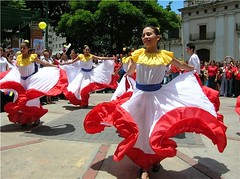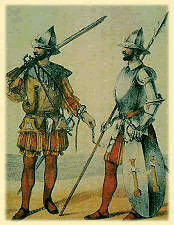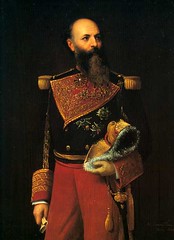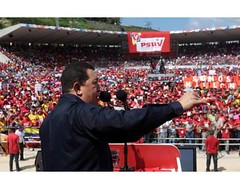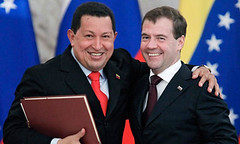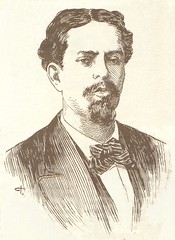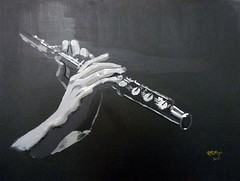1498-99 - Christopher Columbus and Alonso de Ojeda visit Venezuela, populated by Carib, Arawak and Chibcha peoples.
1521 - Spanish colonization begins on the north-east coast.
1567- Caracas founded as Santiago de Leon de Caracas
1749 - First rebellion against Spanish colonial rule.
1810 - Venezuelan patriots take advantage of Napoleon Bonaparte's invasion of Spain to declare independence.
1811 - Independence Act signed.
1829-30 Venezuela secedes from Gran Colombia and becomes an independent republic with capital at Caracas.
October 2, 1832- Birth of José Ángel Montero
Mid 1800’s- Term joropo became commonly used as a way to define the rhythm, the dance, the song and the actual event of this national dance
1870-88 - Antonio Guzman Blanco becomes governor who attracts foreign investment, modernizes infrastructure and develops agriculture and education.
1880’s- Calypso music imported in from Trinidad
1881- Adoption of national anthem “Gloria al bravo pueblo”
August 24, 1881- Death of José Ángel Montero
December 8, 1887- Birth of Vicente Emilio Sojo
11 April 1898-Birth of Juana Maria de la Concepcion (Conny Méndez)
1902 - Venezuela fails to repay loans and therefore ports are blockaded by British, Italian and German warships.
1904- Birth of Moisés Moleiro
1908-35 - Dictator Juan Vicente Gomez governs at a time when Venezuela becomes world's largest exporter of oil.
August 3, 1917- Birth of Antonio Lauro
By the 1920’s- Joropo became very prominent
August 8, 1928- Birth of Simón Narciso Díaz Márquez, Grammy Award winner preserved and popularized Venezuelan music through his works
October 2, 1832- José Ánjel Montero
December 12, 1941- Birth of Roberto Ruscitti
1947-48 - President Romulo Gallegos, Venezuela's first democratically elected leader, is overthrown within eight months in a military coup led by Marcos Perez Jimenez and who forms a government backed by the US and U.S armed forces.
1953- Birth of Eduardo Maturet
1958 - Admiral Wolfgang Larrazabal ousts Marcos Perez Jimenez; leftist Romulo Betancourt of the Democratic Action Party wins country’s first democratic presidential election.
1960’s- Popularization of traditional, often Christmas, folk music, Gaita by the group Guaco
1964 - Dr Raul Leoni of Activist Party is elected president- the country’s first presidential handover from one civilian to another.
1970’s- Nueva Canción movement reached Venezuela
1973 - Venezuela oil and steel industries nationalized and Venezuela benefits from oil boom, its currency peaks against that of the U.S. dollar.
August 11, 1974-Death of Vicente Emilio Sojo
1975- Famous salsa artist Oscar D’León recorded his most famous song “Llorarás” with Dimensión Latina
1979- Death of Moisés Moleiro
26 November 1979- Death of Juana Maria de la Concepcion (Conny Méndez)
15 August 1980- Grupo Madera established, known for promoting older African-derived styles of sangueo, the tambor San Millán and the culo e' puya
1983-84 - Fall in world oil prices generates unrest and cuts in welfare spending. Dr Jaime Lusinchi of the Activist Party elected president and signs pact involving government, trade unions and business.
April 18, 1986-Death of Antonio Lauro
1989 - Carlos Andres Perez of Activist Party elected president during backdrop of an economic depression. Social and political upheaval includes riots, in which between 300 and 2,000 people are killed, martial law and a general strike.
1992 - Around 120 people are killed in two attempted coups, the first led by future president Colonel Hugo Chavez, and the second carried out by his supporters. Chavez is jailed for two years.
1993-95 - Ramon Jose Velasquez becomes interim president after Perez is ousted on charges of corruption; Rafael Caldera elected president.
1996 - Perez is imprisoned after being found guilty of embezzlement and corruption.
1998 - Hugo Chavez elected president.
1999 - Severe floods and mudslides in the north, killing tens of thousands of people.
Late 1990’s- Strong electronic music movement spread through the country. Several big multimedia festivals took place main bands/DJ's of this era are Ojo Fatuo, DJ Oddo and DJ Wyz
2000 - Chavez wins another six years in office and a mandate to pursue political reforms.
Chavez becomes the first foreign head of state to visit Iraq since the 1991 Gulf war.
2002 February - National currency, the bolivar, plummets 25% against the US dollar after the government scraps exchange rate controls.
2002 11 April - 150,000 people rally in support of strike and oil protest. National Guard and pro-Chavez gunmen clash with protesters - more than 10 are killed and 110 injured. Military high command rebels and demands that Chavez resign.
2002 April 12 - Armed forces head announces Chavez has resigned, a claim later denied by Chavez. Chavez is taken into military custody through U.S. involvement. Military names Pedro Carmona, one of the strike organizers, as head of transitional government.
2002 April 14 - Chavez returns to office after the collapse of the interim government.
2004 August - President Chavez wins referendum in which Venezuelans are asked whether he should serve out the remaining two-and-a-half years of his term.
2005 January - President Chavez signs decree on land reform which aims to eliminate Venezuela's large estates. President says land redistribution will bring justice to rural poor; ranchers say move is an attack on private property.
2005 June - Venezuela and 13 Caribbean states launch a regional oil company at a summit in Caracas. Venezuela, a major producer, agrees to supply the nations with cheap fuel. Critics accuse President Chavez of using oil to increase diplomatic influence.
2006 July - President Chavez signs a $3bn (£1.6bn) arms deal with Russia, including an agreement to buy fighter jets and helicopters.
2006 December - Hugo Chavez wins a third term in presidential elections with 63% of the vote.
September 15, 2007-Death of Aldemaro Romero
2007 January - President Chavez announces that key energy and telecommunications companies will be nationalized.
2007 May - Government takes control of oil projects in the Orinoco Delta as part of the nationalization drive.
Government's closure of the RCTV channel which has been critical of President Chavez.
2007 June - Two leading US oil companies, Exxon Mobil and ConocoPhilips, refuse to hand over majority control of their operations in the Orinoco Belt to the Venezuelan government.
2008 August - President Chavez announces plans to nationalize the Spanish-owned Bank of Venezuela.
2008 September - Venezuela and Russia sign oil and gas cooperation accord. Russian warplanes visit Venezuela, with Russian warships heading there for November joint exercises - first return of Russian navy to Americas since Cold War.
Venezuela expels US ambassador in solidarity.
2008 October - First Venezuelan telecommunications satellite launched from China.
2008 November - Russia and Venezuela sign accord on joint civilian nuclear cooperation.
2009 February - Voters in a referendum approve plans to abolish limits on the number of terms in office for elected officials.
2010 January - President Chavez devalues the bolivar, by 17% against the US dollar for "priority" imports and by 50% for items considered non-essential, to boost revenue from oil exports.
Six TV channels taken off air for breaking rules on transmitting government material.
2010 March - Economy shrank by 5.8 % in last three months of 2009, according to the central bank.
2011 June - Chavez undergoes cancer surgery in Cuba. After his return to Venezuela in July, he reduces his workload and makes shorter speeches than usual.
| 


